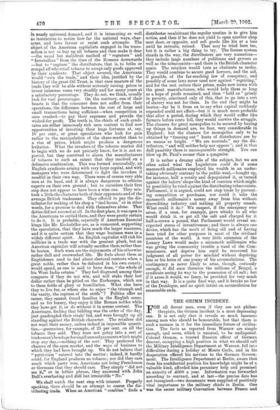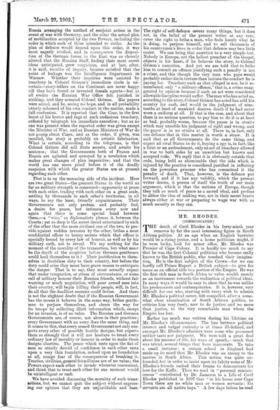THE GRIMM INCIDENT. F OR all decent men, even if they
are not philan- thropists, the Grimm incident is a most depressing one. It is not only that it reveals so much baseness among men who should be honourable, but that there is such a menace in it for the immediate future of civilisa- tion. The facts as reported from Warsaw are simple enough, and seem, which is unusual, to be undisputed. Colonel Grimm, a trusted Russian officer of German descent, occupying a high position in what we should call the Military Intelligence Department at Warsaw, fell into difficulties during a holiday at Monte Carlo, and in his desperation offered his services to the German Govern- ment. The Intelligence Department at Berlin, aware that from his confidential position his knowledge might be of a valuable kind, afforded him pecuniary help and promised an annuity of £600 a year. Information was forwarded according to contract, and at last—the precise date has not transpired—two documents were supplied of positively vital importance to the military chiefs in Berlin. One was the secret military Convention between France and Russia arranging the method of conjoint action in the event of war with Germany, and the other the actual plan of mobilisation accepted. by the two Powers, including the order in which each of them intended to strike. As the plan of defence would depend upon this order, it was most eagerly studied, and in consequence the disposi- tion of the German forces in the East was so cleverly altered that the Russian Staff, finding their most secret ideas anticipated, grew suspicious, and at last, after, it is said, months of inquiry, became satisfied that the point of leakage was the Intelligence Department in Warsaw. Whether their inquiries were assisted by treachery in Colonel Grimm's immediate circle is un- certain—story-tellers on the Continent are never happy till they have found or invented female agents—but at all events the Russian War Office felt justified in striking, and they arrested Colonel Grimm. His papers were seized, and he, seeing no hope, and in all probability utterly ashamed of his own conduct in the matter, made a full confession. It is reported that the Czar, in the first burst of his horror and rage at such audacious treachery, ordered by telegraph his immediate execution; but as no one was present when the reported. order was given except the Minister of War, and as Russian Ministers of War do not gossip about Czars, and as the order, if given, was recalled, the story is probably an artistic fabrication. What is certain, according to the telegrams, is that Colonel Grimm did sell State secrets, and awaits his sentence; that the Governments both of France and Russia are agitated and annoyed by a revelation which makes great changes of plan imperative; and that the world has one more proof before it of the deadly suspicion with which the greater States are at present regarding each other.
That is to us the menacing side of the incident. Here are two great States—the greatest States in the world as far as military strength is concerned—apparently at peace with each other, trading with each other on a great scale, settling by thousands in each other's territories, in all ways, to say the least, friendly acquaintances. Their Governments not only profess, and probably feel, a desire for peace, but intimate every now and again that there is some special bond between them,—a " wire," as diplomatists phrase it, between the Courts; yet so deep is the secret dread entertained by each of the other that the more civilised one of the two, to pro- vide against sudden invasion by the other, bribes a most confidential officer to betray secrets which that officer is specially bound by every law of honour, as well as by his military oath, not to reveal. We say nothing for the moment of the morality of the transaction, but what must be the depth of the suspicion before German gentlemen could lend themselves to it ? Their justification to them- selves is doubtless duty to their country, but before the duty could arise they must have grave reason to anticipate the danger. That is to say, they must actually expect that under temptation, or stress of circumstance, or some call of military honour their Russian friends, without fair warning or much negotiation, will pour armed men into their country, will begin killing their people, will, in fact, do all that the deadliest enemies could devise. And there is not the slightest doubt that if the Russian Government has the means it behaves in the same way, bribes gentle- men to perjure themselves, and clears the way for its troops by collecting illicit information which, except for an invasion, is of no value. The Russian and German Governments are, of course, not alone in their practices ; every Government with an army does the same thing, and it comes to this, that every armed Government not only sus- pects every other of possible hostile designs, but expects them so strongly that it will not hesitate to break every ordinary law of morality or honour in order to make those designs abortive. The peace which rests upon the fiat of men so utterly devoid of confidence in each other rests upon a very thin foundation, indeed upon no foundation at all, except fear of the consequences of breaking it. Treaties, civilities, general friendliness are of no value ; the Powers expect each other to invade whenever convenient, and think that to trust each other for one moment would be unintelligent or rash.
We have avoided discussing the morality of such trans- actions, but we cannot quit the subject without express- ing our opinion that they are unjustifiable and base. The right of self-defence covers many things, but it does not, in the belief of the present writer at any rate, cover the right to bribe a man, who feels keenly what he is doing, to perjure himself, and to sell thousands of his countrymen's lives in order that defence may be a little easier. We can bring that assertion to a very simple test. Nobody in Europe, not the holiest preacher of the Gospel, objects in his heart, if he believes the story, to Colonel Grimm's execution. And yet we are told that to bribe him to commit an offence justifying such a penalty is not a crime, and this though the very man who pays would probably rather die in torture than imitate the conduct he is paying for. Treachery such as that alleged is not, be it re- membered, only " a military offence," that is, a crime exag- gerated by opinion because if such an act were considered allowable discipline would suffer. The man who has acted as, according to the story, Colonel Grimm has acted has sold his country for cash, and would in the judgment of nine- tenths at least of mankind. deserve death if he had never worn a uniform at all. If that is the case, and about that there is no serious question, to pay him to do it is at least as bad, probably worse, because the payee is in straits which may unsettle his judgment of right and wrong, and the payer is in no straits at all. There is, in fact, only one defence that in this matter is worth a straw. It is said that as all Governments do the same thing, and expect all rival States to do it, buying a spy is, in fact, like a feint or an ambushment, only an act of treachery allowed in war to both sides by an unwritten but known and accepted code. We reply that it is obviously outside that code, being held so abominable that the side which is injured. by the practice is considered justified in inflicting on the powerless prisoner who has committed it the penalty of death. That, however, is the defence put forward, and if it has any validity, which the present writer denies, it proves of itself the truth of our main argument, which is that the nations of Europe, though they talk so much of peace as a sacred ideal, and profess to abhor the idea of making war, are in their secret hearts always either at war or preparing to wage war with as much security as they can.







































 Previous page
Previous page